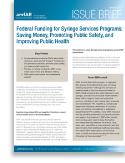
Injection drug use remains a driving force in the national HIV epidemic, accounting for 14 percent of new infections among women and 7–11 percent of new infections among men in the United States in 2010. Needle sharing during injection drug use is also the primary driver of hepatitis C infection in the United States A new issue brief released by amfAR asserts that the ban on federal funding for SSPs impedes domestic efforts to meet the goals of the National HIV/AIDS Strategy and to achieve an “AIDS-Free Generation.”
In 2009, Congress removed a 21-year prohibition on the use of federal funds to support SSPs. Two years later, however, Congress re-imposed the ban. In “Federal Funding for Syringe Services Programs: Saving Money, Promoting Public Safety, and Improving Public Health,” amfAR argues that a conclusive body of evidence demonstrates SSPs help prevent infection by reducing the re-use and circulation of injecting equipment without increasing drug use or resulting in other negative consequences. SSPs currently operate in 186 U.S. cities, and have been endorsed by numerous medical and public health organizations, as well as law enforcement officials across the U.S.
Despite this consensus, jurisdictions are still not able to use federal funds to support SSPs. The supplies provided by SSPs to prevent new infections are substantially cheaper than the cost of treating HIV or hepatitis C, and SSPs facilitate drug users’ connection to treatment and health care. In addition to reducing health care costs and benefiting individual drug users, studies have shown that SSPs provide a significant public safety benefit to communities by reducing the number of improperly discarded syringes, and lowering the risk of needlestick injuries to law enforcement.
During the brief lifting of the ban on federal funding, federal dollars were used to support SSPs in California, Connecticut, Delaware, Illinois, Massachusetts, Minnesota, New Jersey, New Mexico, New York, Puerto Rico, Vermont, and Washington. The ability to again use federal funds to support SSPs would undoubtedly be welcomed by jurisdictions in these states and in others that are eager to prevent new HIV infections, preserve public resources, and support public health and safety goals.